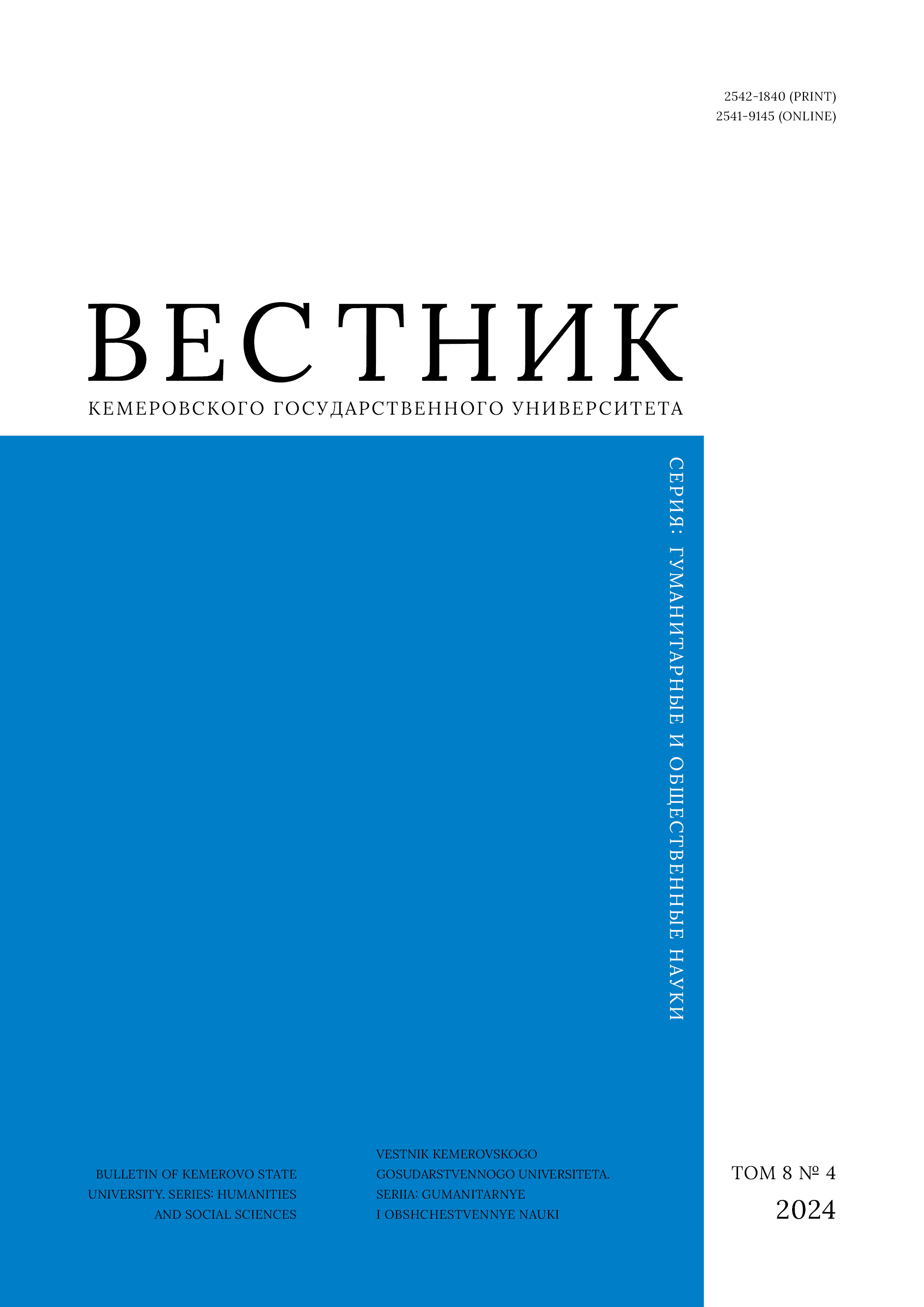Novokuzneck, Russian Federation
Mathematics can offer a number of diagnostic tools to assess the level of meta-subject skills in students of 5–9 grades. The author developed a math task for paired work as a comprehensive assessment tool for universal academic skills. As students worked in pairs to perform a mathematical study, the author used a tiered approach to assess their soft skills in a particular context. The task included a roadmap that made it possible to control the sequence of actions and independence of their implementation. The motivational, cognitive, activity-based, and productive development criteria were specified by different indicators. The meta-subject skills fell into six levels depending on the degree of individual performance and the quality of the actions performed. The Spearman correlation coefficient demonstrated the reliability and validity of the new diagnostic tool. The method was tested in Kuzbass schools, and teachers of mathematics pointed out its efficiency. The article offers a sample of a roadmap for a math task to be prepared in pairs by 5–9-graders.
universal learning activities, meta-subject skills, research task, academic and research map, diagnostic tools, levels of development of meta-subject skills, teaching mathematics
1. Roslova L. O., Alekseeva E. E., Butsko E. V. Achievement of meta-subject results as part of mathematical disciplines at secondary school. Moscow: ISED, 2023, 73. (In Russ.) https://elibrary.ru/bmktcc
2. Shkerina L. V., Cave M. A., Berseneva O. V., Zhuravleva N. A. Monitoring the level of formation of meta-subject results while teaching mathematics to fifth-graders. Krasnoyarsk: KSPU, 2018, 188. (In Russ.) https://elibrary.ru/xwvsvn
3. Gimatdinova G. N., Shashkina M. B. Diagnostics and development of regulatory universal learning actions of students in mathematics lessons in 7–9 grades of general education school. Modern problems of science and education, 2023, (6). (In Russ.) https://doi.org/10.17513/spno.33074 EDN: https://elibrary.ru/BHTWIZ
4. Tumasheva O. V., Shashkina M. B. Formation and evaluation means meta-subject educational results of students generation Z. Azimuth of scientific research: Pedagogy and psychology, 2020, 9(1): 285–289. (In Russ.) https://doi.org/10.26140/anip-2020-0901-0067 EDN: https://elibrary.ru/KAPPMS
5. Zhuravlev I. A. Diagnosis of the level of formation of universal learning activities of students at mathematics classes. Modern problems of science and education, 2014, (1): 101–109. (In Russ.) https://elibrary.ru/sbktrj
6. Perevoshchikova E. N. Specifics of developing universal learning actions in teaching mathematics in a secondary school. Integration of education, 2015, 19(2): 81–90. (In Russ.) https://doi.org/10.15507/Inted.079.019.201502.081 EDN: https://elibrary.ru/VBKMPZ
7. Shkerina L. V., Gavrilyuk A. S., Tabinova O. A., Shashkina M. B. Bi-objective monitoring of the results of mastering universal educational activities by students in 7th–9th grades in the process of teaching mathematics. Perspectives of science and education, 2020, (2): 179–194. (In Russ.) https://doi.org/10.32744/pse.2020.2.15 EDN: https://elibrary.ru/PDDIRO
8. Shkerina L. V., Berseneva O. V., Zhuravleva N. A., Cave M. A. The meta-disciplinary Olympiad for school students: The new approach to assessing the meta-disciplinary universal educational actions of students. Perspectives of science and education, 2019, (2): 194–211. (In Russ.) https://doi.org/10.32744/pse.2019.2.15 EDN: https://elibrary.ru/HNULTN
9. Koksharova E. A. Designing a web application for diagnosing the levels of cognitive development while teaching mathematics. Innovatsii. Nauka. Obrazovanie, 2020, (17): 445–454. (In Russ.) https://elibrary.ru/gfrjla
10. Poberezkaya V. F., Novikova N. N. Diagnostics of regulatory learners’ universal educational actions in the context of distance learning. Concept, 2021, (5): 81–96. (In Russ.) https://doi.org/10.24412/2304-120X-2021-11033 EDN: https://elibrary.ru/GHXDEA
11. Pozdnyakova E. V., Pichugova V. V. Text plot tasks with a parameter as a means of forming the research skills of students in grades 7–9. Journal of Pedagogical Research, 2022, 7(6): 49–56. (In Russ.) https://elibrary.ru/dlpqqt
12. Bekesheva I. S., Bobyleva O. V., Drozdova K. V. Independent evaluation of level of formation of cognitive uea of schoolchildren with non-standard tasks on mathematics. Vestnik of Altai State Pedagogical University, 2018, (4): 31–35. (In Russ.) https://elibrary.ru/vnfoip
13. Pozdnyakova E. V. Sone methodological aspects of the formation and diagnosis of meta-subject skills of 5th–9th grade students in teaching mathematics. Innovation in education, 2023, (11): 23–34. (In Russ.) https://elibrary.ru/mojpkl
14. Dalinger V. A., Knyazeva O. O. Academic and research work of students in mathematics. Omsk: Amfora, 2017, 224. (In Russ.) https://elibrary.ru/xxppjy
15. Podkhodova N. S., Panova K. V. Multisubject practise problems as an instrument for developing students in teaching mathematics. Modern problems of science and education, 2016, (6). (In Russ.) https://elibrary.ru/xiblsx
16. Ilyushin L. S. Planning classes with Task Designer. Public education, 2013, (2): 159–168. (In Russ.) https://elibrary.ru/pyopkb
17. Pozdnyakova E. V., Fomina A. V. Open-tyre tasks as a means of developing "soft skills" in math lessons. Research result. Pedagogy and psychology of education, 2021, 7(2): 29–45. (In Russ.) https://doi.org/10.18413/2313-8971-2021-7-2-0-3 EDN: https://elibrary.ru/AOACST
18. Pozdnyakova E. V., Malyshenko G. A. Meta-subject tasks in online services as a means of forming mathematical literacy of ninth-grade students. Science and school, 2023, (4): 212–224. (In Russ.) https://doi.org/10.31862/1819-463X-2023-4-212-224 EDN: https://elibrary.ru/LBPORH
19. Pozdnyakova E. V., Fomina A. V. Designing diagnostic tools to determine the level of formation of universal educational actions in the mathematics course of primary school. Azimuth of scientific research: Pedagogy andpsychology, 2018, 7(1): 171–176. (In Russ.) https://elibrary.ru/ytxpxr
20. Koroteeva A. S., Chelpachenko T. V. Cognitive independence as a pedagogical phenomenon. Vestnik of the Orenburg State University, 2022, (4): 47–52. (In Russ.) https://doi.org/10.25198/1814-6457-236-47 EDN: https://elibrary.ru/CHIWAW
21. Bespalko V. P. Diagnostic tools for assessing the quality of students’ knowledge. School technologies, 2006, (2): 138–151. (In Russ.) https://elibrary.ru/hukyzx
22. Osipova S. I., Agisheva N. S. Cognitive activity as an object of pedagogical analysis. Humanization of education, 2016, (2): 89–96. (In Russ.) https://elibrary.ru/vzellr
23. Usova A. V., Bobrov A. A. Developing learning skills in students. Moscow: Znanie, 1987, 80. (In Russ.) https://elibrary.ru/uamkfh
24. Guzeev V. V., Kurchatkina I. B. Individual student progress: How to evaluate it. Public education, 2011, (7): 161–169. (In Russ.) https://elibrary.ru/ofvzyp


















